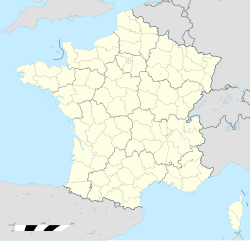Avaricum
| Location | France |
|---|---|
| Region | Centre-Val de Loire |
| Coordinates | 47°05′04″N 2°23′47″E / 47.0844°N 2.3964°E |
| Siege of Avaricum | |||||||
|---|---|---|---|---|---|---|---|
| Part of the Gallic Wars | |||||||
|
|||||||
| Belligerents | |||||||
| Roman Republic |
Bituriges Arverni |
||||||
| Commanders and leaders | |||||||
| Gaius Julius Caesar | Vercingetorix | ||||||
Avaricum was an oppidum in ancient Gaul, near what is now the city of Bourges. Avaricum, situated in the lands of the Bituriges, was the largest and best-fortified town within their territory, situated on very fertile lands. The terrain favored the oppidum, as it was flanked by a river and marshland, with only a single narrow entrance. By the time of the Roman conquest in 52 BC the city according to Julius Caesar had a population of 40,000 people.
Julius Caesar, after a series of victories at Vellaunodunum, Genabum, and Noviodunum Biturigum, had arrived at Avaricum in the winter of 52 BC, intent on denying its grain and steel to the rebellious Gauls. Vercingetorix, aware that he had already been bested three times, decided to change tactics. Calling together a council of the tribes in rebellion against Rome, he convinced them to adopt Fabian strategy, never offering combat with Caesar's forces, and denying them supplies. All the towns within range of Caesar's foraging parties were destroyed, the land stripped bare, and all grain removed or burned, in a scorched earth tactic. However, Avaricum was spared this fate since the Bituriges argued the town was impossible to take, and Vercingetorix agreed to make the town an exception.
However, upon Caesar's appearance at the gates of Avaricum, Vercingetorix moved his army to a distance fifteen miles outside town, perfectly situated so Caesar could not leave without a battle, nor could he forage at will. To add to his woes, Caesar's allies, the Aedui and the Boii, were unable to supply him, the former because they had quietly joined Vercingetorix in his rebellion, the latter because they simply did not have any food to spare. The shortage of grain was so acute that the men ate meat, despite the fact that they did not really enjoy it. Caesar personally made the rounds amongst his men, telling them that if the scarcity of food was too much, he would lift the siege and withdraw. His soldiers protested, refusing to end a siege in disgrace when they still had to avenge the innocent Romans murdered by the Gauls.
...
Wikipedia

